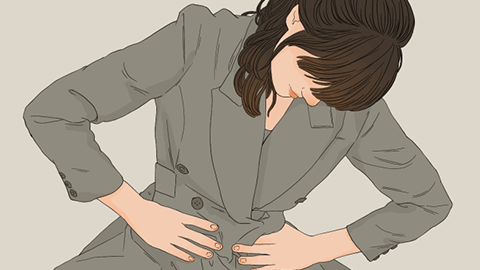Menstrual blood clots: What causes them?
Menstruation refers to the menstrual period. The presence of blood clots during menstruation may be caused by prolonged sitting, catching a chill, endocrine disorders, endometritis, endometriosis, and other factors. Management should be based on the specific situation. If physical discomfort occurs, it is recommended to seek medical attention at a hospital promptly and follow medical advice for treatment.

1. Prolonged Sitting: Sitting for extended periods can cause menstrual blood to accumulate in the uterine cavity, making it prone to clotting upon discharge. It is recommended to engage in moderate physical activity during menstruation, such as walking or simple yoga stretches, to facilitate smooth menstrual flow. Avoid prolonged sitting in daily life as well, and get up to move around for a few minutes every hour to improve pelvic blood circulation.
2. Catching a Chill: Consuming cold beverages or being exposed to cold drafts during menstruation can allow cold pathogens to invade the uterus, causing menstrual blood to stagnate and form clots. It is important to stay warm, drink plenty of warm water or warm brown sugar water, and apply a hot water bottle to the abdomen to dispel internal cold and alleviate the formation of blood clots.
3. Endocrine Disorders: Chronic stress and irregular sleep patterns can lead to endocrine disorders, with hormonal imbalances affecting endometrial growth and shedding, resulting in blood clots. Symptoms may also include irregular menstrual cycles and mood swings. It is recommended to use medications such as Modified Xiaoyao Pills, Qizhi Xiangfu Pills, and Wujibai Feng Pills under medical guidance to relieve discomfort.
4. Endometritis: Inflammation of the endometrium caused by bacterial infection leads to abnormal shedding of the endometrium, with menstrual blood mixed with inflammatory secretions forming blood clots. Symptoms may include abdominal pain and prolonged menstruation. Patients may use medications such as Metronidazole Tablets, Levofloxacin Hydrochloride Capsules, and Fuke Qianjin Tablets under medical supervision to alleviate symptoms.
5. Endometriosis: Endometriosis refers to the growth of endometrial tissue outside the uterus, such as on the ovaries, fallopian tubes, or pelvic cavity, leading to menstrual abnormalities and blood clot formation. Common symptoms include dysmenorrhea, pain during sexual intercourse, and infertility. It is recommended to use medications such as Danazol Capsules, Gestrinone Capsules, and Norethisterone Tablets under medical guidance to improve symptoms.
Women should take care of their health during menstruation, avoiding spicy and cold foods, maintaining a balanced diet, and ensuring regular and healthy sleep patterns.
References:
[1] Zhao Mingchun. "Study on the clinical value of endometrial biopsy in abnormal uterine bleeding." Guizhou Medical Journal, 2025, 49(03): 450-451.
[2] Wang Pei, Liu Lili, Lan Dantong, et al. "Exploring the mechanism of Neiyigao in treating endometriosis based on network pharmacology and transcriptomics." Journal of Guangzhou University of Chinese Medicine, 2025, 42(03): 700-708.




